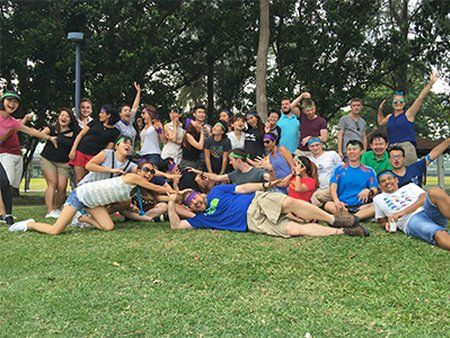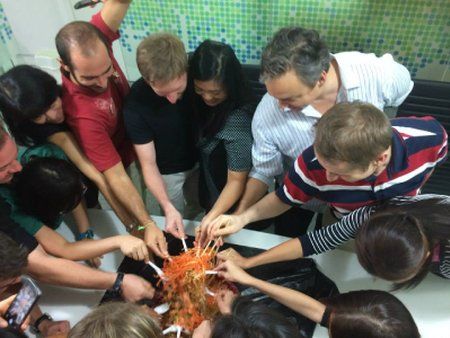We've been working with Eyeota for the last 3 years, supporting their hiring in Singapore, so it was a real pleasure to sit down with Matt Clarkson, their VP Engineering, and discuss his talent strategy and outlook on the industry. He shared some great insights, and even some tips for new grads who want to get into tech!
.jpg)
Name: Matt Clarkson
Title: VP, Engineering
Company: Eyeota
Founded: 2010, we now have offices in Berlin, New York, Sydney, Melbourne, London, Tokyo and Singapore
Number of team members: We have around 60 employees globally. In our Singapore headquarters we have over 30, with functions such as HR, Finance, Technology and Data Analytics based here.
What does Eyeota do?
Eyeota is an audience data company that aggregates offline and online user data from publishers and data suppliers and distributes this data for use by platforms, brands and agencies. Our data is central to the way digital products and services, especially advertising, are delivered online.

What sets Eyeota apart from the crowd?
There aren’t many companies in our space that have the scale and international reach that we do. On top of that, we have strong global relationships with data providers and data partners and are highly integrated with a large number of platforms.
From a technical point of view, we are scaled very highly for a company our size. Our platform is solving problems both in terms of handling a very large number of signals from the web at low latency, as well as handling the types of petabyte scale challenges that are more typical in the big data space.
Having a relatively small engineering team that punches way above its weight is another advantage we have – staying small means we can stay agile and jump on opportunities very quickly when they arise.
.jpg)
What do you see as some key emerging trends in the industry in 2017 and beyond?
Regionally, specifically in Southeast Asia, we’re in the early stages of a period of massive growth in terms of the number people coming online. This phenomenon is the prime driver of digital economies within the region and is evidenced by the recent entry of two of the biggest ecommerce companies in the world here.
One really exciting thing in the region is how “start-up culture”, namely the tools and methods used in progressive tech companies, is now becoming the norm. It’s more or less taken for granted that when you walk into a shop that they’ll be using modern open source tools and agile software development methods.
More broadly, one thing that we’re keeping an eye on is the upcoming EU privacy legislation, the GDPR, which will be going into effect next year. This is a massive regulatory upgrade which will have a far-reaching impact on any company that creates, transports, stores, analyses, or otherwise deals with consumer data. There is going be a big scramble by businesses across many industries to pull themselves into compliance.
From a technology point of view, regional short-term themes are cloud computing moving from early adopter to early majority levels of adoptions in the region. The biggest cloud providers are aggressively hiring into their solutions businesses, which is an indication that they are expanding their capacity to help their customers architect systems using their products. We’re also seeing that skills in distributed computing technologies, that were very scarce when we got started, are now becoming easier to find.
From a longer-term, more global, point of view, machine learning and blockchain are two technologies that absolutely have the potential to transform economies. It’s clear already that we’re in the midst of a revolution in computing with respect to the use of AI. With blockchain, we’re much earlier in the adoption cycle but I think there is potential there to disrupt on some very fundamental economic levels.
.jpg)
What is your advice to fresh graduates just starting out in tech?
My advice to them is they should have a good grounding in at least one common language, like Java, Python, C++ or JavaScript. Focusing on one systems programming language and one scripting language for starters would be even better. Software Engineering is 100% experience driven - to learn, you really need to apply it. Experiment - get a cloud account and deploy stuff there, play with open source, put yourself out there, be fearless, don’t worry if someone says your code is not good, just use the feedback to learn.
The other thing I’d say is to learn how to collaborate with others to write software. Historically, the academic environment was really oriented around solo activity. Open source culture has now crept in enough that this may not be as much the case as it once was but nevertheless, software in industry is generally a team sport so it pays to learn the techniques developers use to collaborate.
What about Clean Code?
A piece of software has a lifecycle. Until it is out of production, it has to be managed, so it is important to have solid design principles, like separation of concerns and cohesion, in place. It’s critical to know how to write and run tests to prevent software bugs from sneaking in. The main objective is to let your work to be easily understood and extended by yourself or others.
.jpg)
What do you look for when hiring great talent to join your team?
In a nutshell: Cultural Fit and Technical Aptitude
With respect to the former, we do not compromise. We need to know new hires have the same fundamental values that we do. For us that includes:
A strong work ethic
Service oriented mentality
Curious and passionate about learning
A fundamental desire to solve problems
Confident yet humble
Technically – we generally look for someone who:
Has depth in one programming language that we use (Java, JS, Clojure, Go)
Knows how to test effectively
Knows how to design systems for testability
Is deep in one or two areas and broad across several more
Depending on seniority, we also look if they have designed or architected projects
Will teach others in their areas of specialization
A big part of my job is to help get that good mix. With respect to recruiting and talent development, I like the gardening analogy for technical leadership: plant seeds and help them grow, transfer them when they outgrow their patch, and weed when necessary.
.jpg)
How easy do you find it to hire and retain great talent?
There are a lot of developers in Singapore but there is definitely more demand than supply, which is a global phenomenon. I see a lot of CVs, but I don’t necessary see a lot of CVs with the right mix of experience and technologies that we need.
During the early stage of a start-up, every hire is crucial. Now that we are scaling, we have a core group of strong engineers and our issue now is: do we train? For example, if we see someone who has strong enterprise Java but doesn’t have the low latency Java programming techniques we require to write what we need, we have to figure out if we can train them to pick those up- that’s the hard part!
In terms of retaining talent, there are a few fundamental things that need to be in place for engineers to be happy. Does the team have a sense of mission? Are they building stuff that is meaningful? Opportunities to learn are super important. Is the work challenging and diverse enough to meet that need? Do they enjoy the people they work with and the environment in which they’re working? How do the managers behave? Is there sufficient autonomy and an overall lack of irrational behavior?
Of course, compensation & benefits are important as well. In my experience though, if the things I just mentioned are not in place, folks will eventually be dissatisfied and seek employment elsewhere no matter what their compensation looks like.
We want to provide a super engineering-friendly culture in which people can grow and learn, whether that’s in the tech, leadership, or personal realms. I sit with my reports 1 to 1 at least once every two weeks, to give them a chance to clear any issues with me. So far, that has been a great tool for staying in touch with the hopes, aspirations, and gripes of my staff and making sure that we are staying ahead of any issues.

#TalentTalk
